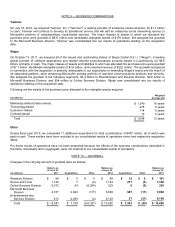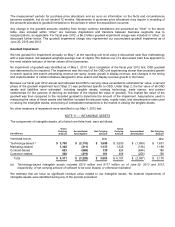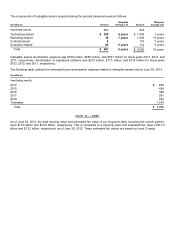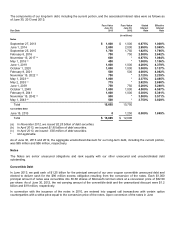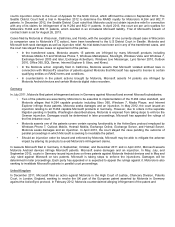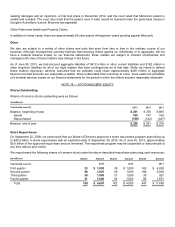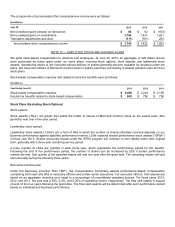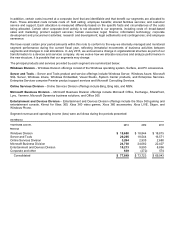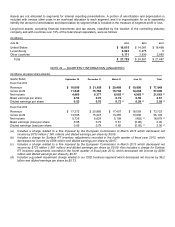Microsoft 2013 Annual Report Download - page 71
Download and view the complete annual report
Please find page 71 of the 2013 Microsoft annual report below. You can navigate through the pages in the report by either clicking on the pages listed below, or by using the keyword search tool below to find specific information within the annual report.
Indemnifications
We provide indemnifications of varying scope and size to certain customers against claims of intellectual property
infringement made by third parties arising from the use of our products and certain other matters. We evaluate estimated
losses for these indemnifications, and we consider such factors as the degree of probability of an unfavorable outcome
and the ability to make a reasonable estimate of the amount of loss. To date, we have not encountered significant costs
as a result of these obligations and have not accrued any liabilities related to these indemnifications in our financial
statements.
NOTE 17 — CONTINGENCIES
Antitrust, Unfair Competition, and Overcharge Class Actions
A large number of antitrust and unfair competition class action lawsuits were filed against us in various state, federal, and
Canadian courts on behalf of various classes of direct and indirect purchasers of our PC operating system and certain
other software products between 1999 and 2005. We obtained dismissals or reached settlements of all claims made in the
United States.
All settlements in the United States have received final court approval. Under the settlements, generally class members
can obtain vouchers that entitle them to be reimbursed for purchases of a wide variety of platform-neutral computer
hardware and software. The total value of vouchers we may issue varies by state. We will make available to certain
schools a percentage of those vouchers that are not issued or claimed (one-half to two-thirds depending on the state).
The total value of vouchers we ultimately issue will depend on the number of class members who make claims and are
issued vouchers. The maximum value of vouchers to be issued is approximately $2.7 billion. The actual costs of these
settlements will be less than that maximum amount, depending on the number of class members and schools that are
issued and redeem vouchers. We estimate the total cost to resolve all of the state overcharge class action cases will
range between $1.9 billion and $2.0 billion. At June 30, 2013, we have recorded a liability related to these claims of
approximately $500 million, which reflects our estimated exposure of $1.9 billion less payments made to date of
approximately $1.4 billion mostly for vouchers, legal fees, and administrative expenses.
The three cases pending in British Columbia, Ontario, and Quebec, Canada have not been settled. In March 2010, the
court in the British Columbia case certified it as a class action. In April 2011, the British Columbia Court of Appeal
reversed the class certification ruling and dismissed the case, holding that indirect purchasers do not have a claim. The
plaintiffs have filed an appeal to the Canadian Supreme Court, which was heard in the fall of 2012. The other two actions
have been stayed.
Other Antitrust Litigation and Claims
In November 2004, Novell, Inc. (“Novell”) filed a complaint in U.S. District Court for the District of Utah (later transferred to
federal court in Maryland), asserting antitrust and unfair competition claims against us related to Novell’s ownership of
WordPerfect and other productivity applications during the period between June 1994 and March 1996. In June 2005, the
trial court granted our motion to dismiss four of Novell’s six claims. In March 2010, the trial court granted summary
judgment in favor of Microsoft as to all remaining claims. The court of appeals reversed that ruling as to one claim. Trial of
that claim took place from October to December 2011 and resulted in a mistrial because the jury was unable to reach a
verdict. In July 2012, the trial court granted Microsoft’s motion for judgment as a matter of law. Novell has appealed this
decision to the U.S. Court of Appeals for the Tenth Circuit, which heard oral arguments in May 2013.
Patent and Intellectual Property Claims
Motorola Litigation
In October 2010, Microsoft filed patent infringement complaints against Motorola Mobility (“Motorola”) with the
International Trade Commission (“ITC”) and in U.S. District Court in Seattle for infringement of nine Microsoft patents



